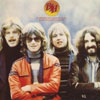BARCLAY JAMES HARVEST : EVERYONE IS EVERYBODY ELSE
- Child of the Universe
- Negative Earth
- Paper Wings
- The Great 1974 Mining Disaster
- Crazy City
- See Me See You
- Poor Boy Blues
- Mill Boys
- For No One
Label : Polydor
Time : 39:04
Release Year : 1974
Review (AllMusic) : The group's first album for Polydor is several steps above their EMI work. Most of the psychedelic-era influences are softened here and broadened, and transmuted into something heavier and more serious, even as the Beatlesque harmonies remain intact. The guitars sound real heavy, almost larger than life here, while the swelling Mellotron and synthesizer sounds give the music the feel of an orchestra. By this time, the group had also mastered the Pink Floyd technique of playing pretty tunes really slowly, which made them sound incredibly profound (it's actually a technique that goes back, in different forms, to Gustav Mahler and Anton Bruckner). John Lees gives superb, virtuoso performances on lead guitar on "Paper Wings" and "For No One." Les Holroyd's gorgeous "Poor Boy Blues" sounded more like Crosby, Stills & Nash than CSN did in those days, and is almost worth the price of the CD.
Review (ProgArchives) : This was Barclay James Harvest's first album for the Polydor label, who must have been delighted with what the band delivered. The album represents a subtle change of direction, with the heavier opening tracks "Negative earth" and "Child of the universe" indicating that the symphonic and orchestral influences apparent in their previous albums had been largely set aside in favour of a more rock orientated feel. This meant that the often cited Moody Blues similarities of their early albums were also less apparent. "The great 1974 mining disaster", appears to be a "tribute" to the Bee Gees song of very similar name, with both lyrics and melody being uncomfortably close to that of the Brothers Gibb. "Crazy city" was one of their most commercial tracks to date (not a criticism!), and was therefore released as a single. The album ends with a trilogy of tracks which join together to form a single piece. "Poor boy blues" and "Mill Boys" cleverly reverse 2 themes between their vocal and instrumental sections. These almost folk like songs give way to one of BJH's great powerful tracks, "For no one" (no relation to the Beatle song). The track crashes in, in similar fashion to "After the day" from "..and other short stories", with John Lees pleading vocals lifting the song to an impassioned climax. "Everyone's a loner till he needs a helping hand, everyone is everybody else". A very complete album, which moved BJH's standing significantly further up the ladder.
